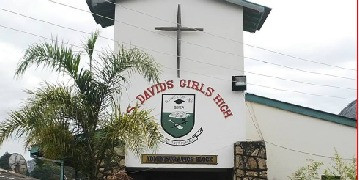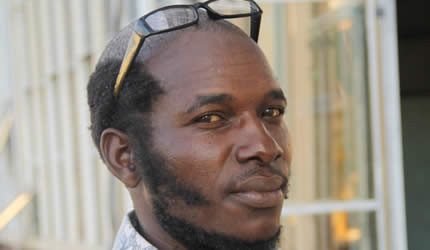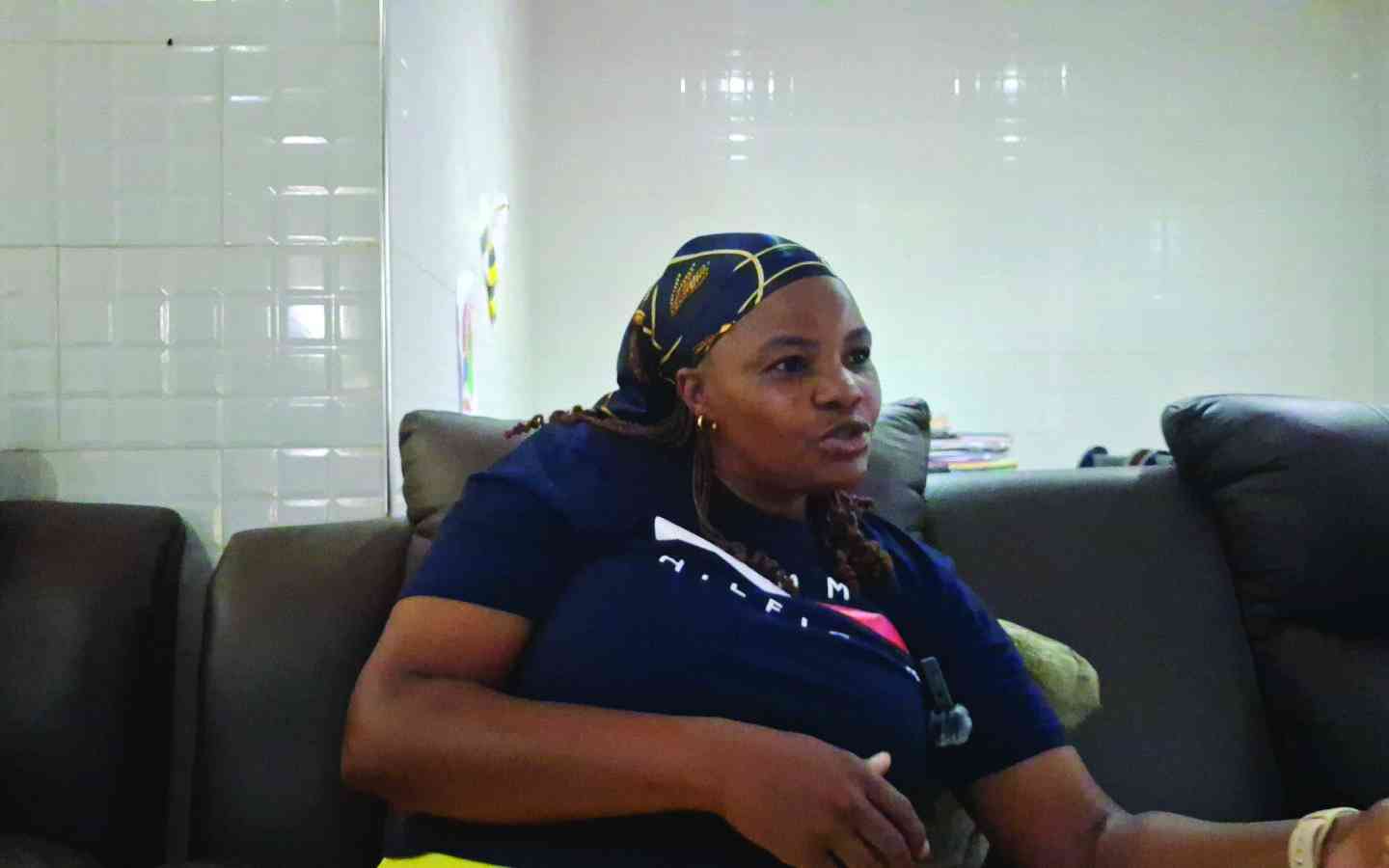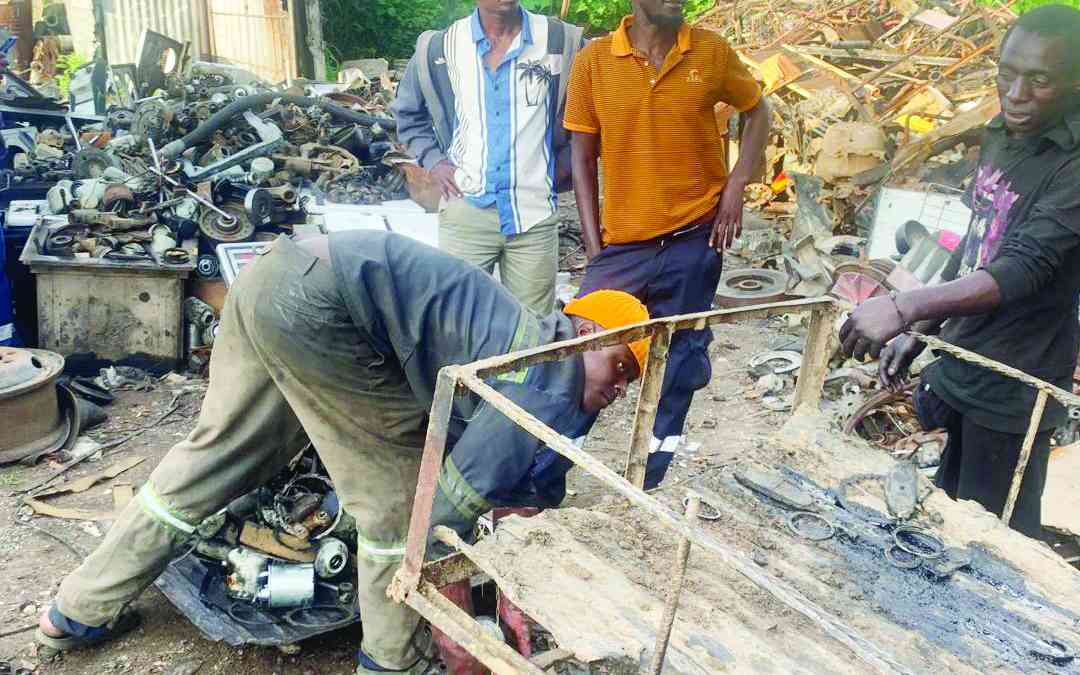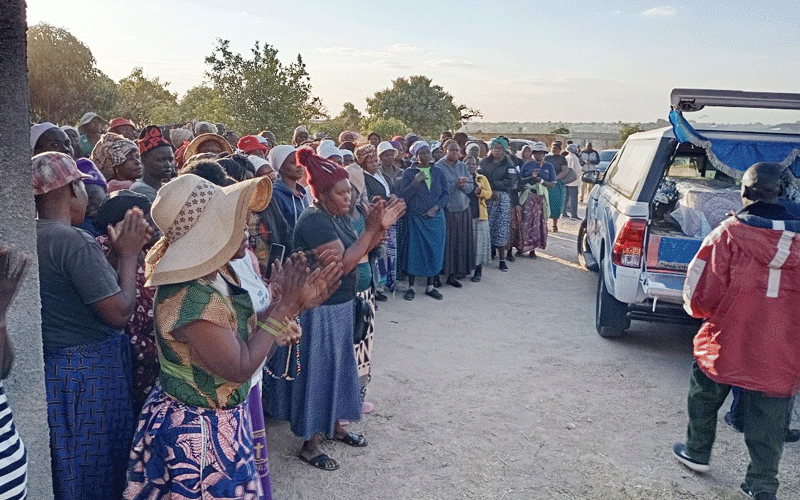
The hearse slowed to a crawl as it approached the Hunyani River bridge along the road linking Harare and the dormitory town of Chitungwiza.
Behind it, a long procession of mourners trailed in silence, cars packed with heavy hearts and bloodshot eyes.
The convoy was escorting 19 year-old Wishby Nganima to his final resting place
Yet before laying him to sleep, they paused — right where fate had rewritten the lives of so many.
On that bridge still lingered the haunting stench of death, heavy in the July air.
Crumpled metal from the kombi crash lay like discarded dreams, the twisted wreckage bearing silent witness to the 17 young lives violently taken in a horrific crash involving a commuter omnibus and a haulage truck last Tuesday. It was a battlefield.
The kind not fought with guns, but with screams, silence, and unanswered questions.
Apostle Archibald Katanha of Mercy Miracle Ministries led a prayer there, but even his words struggled to break through the sobs that filled the space like fog.
- Over 115 to exhibit at Mine Entra
- Young entrepreneur dreams big
- Econet bemoans power outages
- Govt opens ChiTown e-passport centre
Keep Reading
Vehicles from St Mary’s merged onto the Harare-Dema Road like tributaries of grief — an unending stream of pain.
Strangers pulled their cars over. Motorists stood aside with heads bowed, allowing the funeral convoy to pass. In that moment, time stood still, and humanity shone through the sorrow.
At Zororo Cemetery, barely a stone’s throw from the tragedy site, reality hit like a hammer blow.
Nine blue and white tents. Nine caskets. Nine families saying goodbye—simultaneously — just as death had arrived, all at once, without warning, without mercy.
Among them was the casket of Nganima.
He wasn’t just a statistic. He was someone’s son. Someone’s little brother. A boy with dreams, wishes, and a stubborn belief that he would one day rise above his circumstances.
His brother Ignatius spoke with trembling lips: “Wishby used to say he was the most intelligent mind in the family. He wanted to be an entrepreneur. He was always reading, always planning, always hoping.”
He had finished his O’ Level at Rusununguko High School and was preparing to begin college. He wasn’t just chasing success — he was sprinting toward it.
But on that day, his path shifted cruelly.
He had phoned his father at work earlier, hoping to stop by for a cup of tea and a little free Wi-Fi.
“Come tomorrow,” his father said, not knowing that tomorrow would never come.
With his plans altered, Wishby boarded a kombi heading home — a ride that turned out to be a one-way ticket to eternity.
His brother Winglow was also heading home when he found himself stuck in traffic at the bridge.
Curious, he disembarked like others to see what was happening.
And then he saw them.
First, the shoes — Wishby’s worn-out shoes he had said he wanted to replace.
Then, his backpack, unmistakable and heartbreakingly ordinary. That was when Winglow’s world shattered.
“My heart skipped. I knew. I knew he was gone,” Winglow recalled, his voice breaking.
“The only solace is that I was there to identify him. But this pain… this pain will live with us for a very long time.”
The government, in an act of compassion, provided state-assisted funerals for all 17 deceased.
First lady Auxillia Mnangagwa attended the burial at Zororo Cemetery last Friday afternoon, her presence offering comfort, but also gravity.
In her tearful speech, she reminded mourners that grief is not a marathon.
“There is no quick healing,” she said.
“Only slow, painful steps forward.” She concluded her tour to Zororo by laying a wreath on Wishby’s grave.
Totally, the service at Zororo – led by the Christ Embassy church- was deeply anchored in Scripture.
On Wednesday, the family of Tatenda Radson Silya, the driver of the ill-fated commuter omnibus, gathered at the same cemetry to bid their final farewell.
Tatenda was buried in an emotional ceremony attended by relatives, friends, and members of the local transport community.
His funeral was held separately out of respect for the grieving families involved in the mass burial preparations.
Tatenda’s father, Manuel Sliya, a pastor and a member of the Christian Community Police Network visibly shaken, but composed, spoke passionately about his son during the graveside service.
“Tatenda was more than just a driver. He was a young man full of life, deeply committed to his family and always working hard to provide for them.
“It pains me that he is gone too soon and has left behind a young family that still needed him,” he said, struggling to hold back tears.
Tatenda is survived by his wife and two young children.
Many mourners, including fellow drivers, said the loss of Tatenda had left a void in their hearts and raised painful questions about road safety on dangerous spots like Hunyani Bridge and Chinhamo along Seke Road.
Following the tragic accident and several others along Seke Road, residents of Chitungwiza are not only grappling with grief — they are also haunted by a chilling pattern.
They said the road, a vital artery that connects thousands to the capital daily, has become infamous for deadly accidents, particularly in the months of July and August.
Many in the community now believe there is more to the tragedy than just human error or poor road infrastructure.
Whispers of spiritual forces, rituals, and ancestral unrest have resurfaced — fanning fears that the road may be cursed or spiritually defiled.
“Every year around this time, blood is shed on that road,” said Mai Chikomo, an elderly resident of St Mary’s.
“It’s no longer just coincidence. We need cleansing. Something is wrong—very wrong.”
Some locals point to the road’s dark past, which includes multiple mass-casualty crashes, while others speak of possible ritual activity linked to business or political interests.
Urban legends have long circulated about mysterious figures seen at night or vehicles that vanish after accidents — tales that, although unverifiable, have gained new traction in the wake of recent tragedies.
Some residents are calling for traditional ceremonies involving Bira (ancestral appeasement), while churches are being asked to lead prayer marches and deliverance sessions along the road.
In response, both traditional leaders and local churches are mulling at coming together and performing spiritual cleansing rituals.
“This is not just a road — it’s become a place of blood. If we ignore the spiritual side, more lives will be lost,” said Sekuru Munemo, a respected elder in Seke.
The Harava Traditional Leaders Association, an organisation that represents traditional spirit mediums (svikiro), traditional leaders, herbalists and elders in Seke, has added its voice to growing calls for a traditional cleansing ceremony to be held along the troubled Seke Road.
They warned that the road was spiritually defiled and in desperate need of rituals to restore order and peace.
“This is no longer a coincidence. We believe a full traditional ceremony – a bira – must be performed to cleanse the land, especially near black spots where many people have died,” said a representative of the Harava Traditional Leaders Association, Masimba Rubatika.
“From the area around Koala to Chikwanha, the spirits are restless and many lives have been lost.”
Rubatika, who is a senior advisor of Chief Seke Mutema, said tentatively the ceremony would be held next month.
“We are planning to do this in August, which happens to be the month of traditional ceremonies.”
Rubatika said Harava Traditional Leaders Association’s membership includes King Munhumutapa, Chief Seke, village heads Samuel Gurumombe, Hore, Marumbi Tigwari and Nyatsime.
Mama Kelly, who is widely known as a spiritual guide in the Seke and Chitungwiza area, said the road is spiritually “polluted” and is now a hotspot for misfortune and death.
“We have lost too many lives on this road. It is not just bad driving – the spirits are crying. Blood has been shed and the ground needs to be cleansed. Seke Road has become a spiritual battlefield,” she said.
According to Mama Kelly, the growing number of tragedies may be linked to unsettled ancestral spirits or past spiritual wrongs that have never been addressed.
She said it was time for the entire Seke community to come together under traditional guidance to perform cleansing rituals.
“We need to consult the spirits and perform traditional cleansing ceremonies. This road connects our communities, and we cannot ignore the pain it continues to cause,” she added.
Pastors and spiritual leaders from various denominations across Chitungwiza and surrounding areas have united in grief and in purpose.
They are inviting residents, families of the deceased, and all people of goodwill to join in solemn prayer and fasting to honour the departed, seek comfort for the bereaved, and cry out to God for divine intervention on the roads of Zimbabwe.
“We are not only mourning the lives lost in this painful accident,” said chaplain Stanley Chakupa of Believers Hill Church.
“We are also gathering to seek the face of the Lord — for healing, for wisdom, and for protection on our highways. Too many families are burying their loved ones. It has become too much. We must turn to God.”
The event, which a source said will include Scripture readings, worship, intercessory prayer, and candle lighting in memory of the deceased, is scheduled to take place at a day to be announced soon.
Clergy members say the prayers will also be directed at calling for God’s intervention in transforming the hearts of drivers, policymakers, and authorities, so that recklessness, negligence, and infrastructural decay are addressed with urgency and sincerity.
Joining hands in this initiative, Chitungwiza Municipality has pledged moral support for the gathering.
Councillor Gylord Chenjera, speaking at the funeral wake of three family members from Rusvingo Road in Zengeza 1 who perished in the accident, said: “We have tasked our public relations department to engage with the religious leadership for that (prayer event) to happen.”
“We mourn with the families and the entire nation. This was not just a loss to individual households, but to the community and Zimbabwe as a whole,” Chenjera said.
“We fully support this call for prayer; hence our decision to work closely with the church to ensure the event is safely and respectfully conducted.”
As preparations are underway, the local church leadership has reiterated that this is not just a memorial, but a wake-up call — a spiritual cry for help amid what has become a national road carnage crisis.
“We are asking God to cover our roads with His mercy, to stir the hearts of those in leadership to act, and to remind every driver that behind every steering wheel is a life — and behind every passenger seat, a family waiting for their loved one to return,” said bishop Memory Chikomo of Vatendi VaJehova Apostolic Church.
Apostolic Faith Witnesses lead pastor Apostle Admire Zaya weighed in.
“Wherever there is a pattern of consistent happenings, spiritually we see the hand of darkness,” he said.
“We see this as an operation of Satanism, because thieves come to steal, kill and destroy.
“There is need for spiritual cleansing and a visit by the clergy and offer prayers at the red spots along the road is critical”
Zaya said they were expecting to hold prayers along the road next week.
While sceptics argue that the problem lies in poor road planning, reckless driving, and lack of enforcement, many say it is impossible to ignore the timing and repetition of these tragedies — especially in the cold mid-year months.
Some theories link the timing to increased travel to achieve set targets or driver fatigue due to economic hardship.
But for many in Chitungwiza, there’s a deeper, more spiritual fear at play.
As the community mourns, it also searches for answers — both in practical safety reforms and in the unseen realms of spirit and tradition.
Whether it is symbolic or not, the call for a cleansing ritual reflects a people desperate for peace, safety, and closure.
For now, the Harare-Chitungwiza Road remains not just a transport route — but a symbol of mystery, loss, and the urgent need for both healing and accountability.
Eleven years ago, parishioners and leaders from various churches converged under a musasa tree, near Chinhamo Service Station along Seke Road, where 10 people were killed; seven of them on the spot, while six others were seriously injured when a Chitungwiza-bound commuter omnibus veered off the road and rammed a tree.
The Hunyani River Bridge accident adds to a series of major crashes elsewhere in Zimbabwe.
Notably, on February 13, 2025, a bus collided with a truck near Beitbridge, killing 24 people and injuring dozens.
The Traffic Safety Council of Zimbabwe (TSCZ) estimates close to 2 000 lives lost annually, approximately five deaths daily, and road carnage costing nearly US $400 million per year, factoring in injuries, hospital costs, and economic losses.
During the 2025 Easter and Independence holidays, Zimbabwe saw 384 road accidents, up from 286 in 2024. Fatal crashes fell from 26 to 21, with deaths declining slightly from 27 to 24.
However, injuries rose from 159 to 178.

